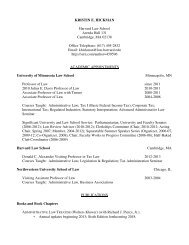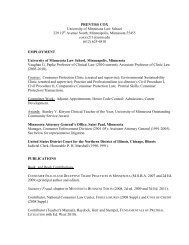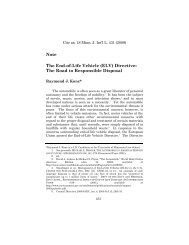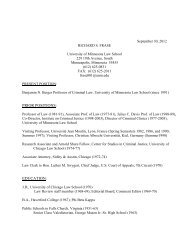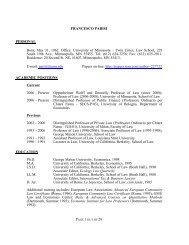Enabling Private Ordering - the University of Minnesota Law School
Enabling Private Ordering - the University of Minnesota Law School
Enabling Private Ordering - the University of Minnesota Law School
Create successful ePaper yourself
Turn your PDF publications into a flip-book with our unique Google optimized e-Paper software.
2009] UMBRELLA CLAUSES 55<br />
between <strong>the</strong> investor and Peru, to an award in which Peru owed<br />
to <strong>the</strong> United Kingdom an international obligation to comply<br />
with its terms, and so to render its enforcement a matter <strong>of</strong><br />
international law.” 149 The agreement <strong>the</strong>refore exclusively<br />
served procedural purposes with respect to <strong>the</strong> effective<br />
enforcement <strong>of</strong> an award rendered by <strong>the</strong> tribunal.<br />
The aspect <strong>of</strong> providing enforcement for a contractual<br />
agreement between a foreign investor and <strong>the</strong> host State was<br />
again <strong>the</strong> main concern in <strong>the</strong> settlement negotiations between<br />
<strong>the</strong> Anglo-Iranian Oil Company (AIOC) and <strong>the</strong> Iranian<br />
Government in <strong>the</strong> early 1950s, after AIOC’s oil operation in<br />
Iran had been nationalized contrary to <strong>the</strong> Concession<br />
Agreement between investor and host State. At issue was not so<br />
much whe<strong>the</strong>r <strong>the</strong> breach <strong>of</strong> <strong>the</strong> Concession Agreement<br />
amounted to a breach <strong>of</strong> international law. Ra<strong>the</strong>r, <strong>the</strong> problem<br />
<strong>of</strong> contract stabilization primarily resulted from defects in <strong>the</strong><br />
dispute settlement and enforcement mechanisms for breaches <strong>of</strong><br />
<strong>the</strong> Concession Agreement. On <strong>the</strong> investor-State level, <strong>the</strong><br />
arbitration clause in <strong>the</strong> concession was ineffective, because it<br />
referred to an appointing authority that had ceased to exist. 150<br />
On <strong>the</strong> inter-State level, a claim by <strong>the</strong> United Kingdom before<br />
<strong>the</strong> International Court <strong>of</strong> Justice (ICJ) failed because Iran had<br />
only accepted <strong>the</strong> Court’s jurisdiction relating to breaches <strong>of</strong><br />
treaties, not however with respect to customary law. 151 The<br />
enforcement problem as regards <strong>the</strong> investor-State contract<br />
<strong>the</strong>refore resulted not from a lack in substantive protection, but<br />
ra<strong>the</strong>r from insufficiencies in third-party dispute settlement<br />
mechanisms.<br />
As a consequence, a primary concern in <strong>the</strong> settlement<br />
negotiations between AIOC and Iran were <strong>the</strong> protection <strong>of</strong> <strong>the</strong><br />
to-be-concluded settlement arrangements against unilateral<br />
breaches by <strong>the</strong> State. Lauterpacht, as AIOC’s advisor,<br />
<strong>the</strong>refore, suggested a double strategy: first, <strong>the</strong> inclusion <strong>of</strong> an<br />
internationalization clause in <strong>the</strong> final settlement agreement<br />
149. Id. at 414.<br />
150. The Concession Agreement designated <strong>the</strong> President <strong>of</strong> <strong>the</strong> PCIJ as <strong>the</strong><br />
appointing authority. After <strong>the</strong> end <strong>of</strong> <strong>the</strong> PCIJ, <strong>the</strong> President <strong>of</strong> <strong>the</strong> ICJ refused to<br />
regard himself as <strong>the</strong> successor <strong>of</strong> <strong>the</strong> President <strong>of</strong> <strong>the</strong> PCIJ and declined to serve as<br />
<strong>the</strong> appointing authority under <strong>the</strong> Concession Agreement. See D. H. N. Johnson,<br />
The Constitution <strong>of</strong> an Arbitral Tribunal, 30 BRIT. Y.B. OF INT’L L. 152 (1953); Elihu<br />
Lauterpacht, International <strong>Law</strong> and <strong>Private</strong> Foreign Investment, 4 IND. J. GLOBAL<br />
LEGAL STUD. 259, 271–72 (1997).<br />
151. Anglo-Iranian Oil Co. (U.K. v. Iran), 1952 I.C.J. 93 (July) (Preliminary<br />
Objections).




